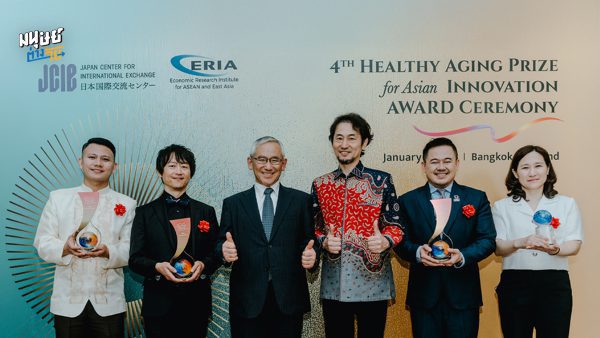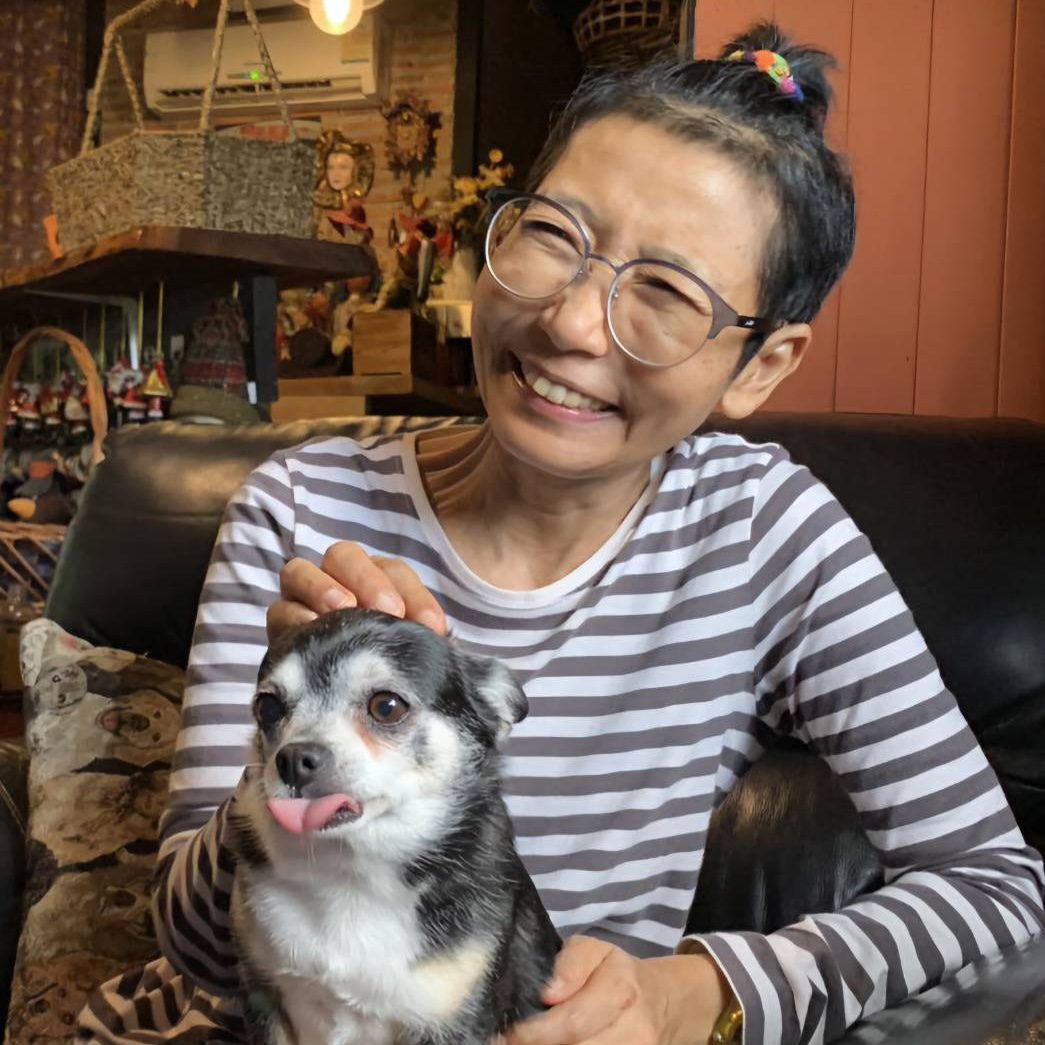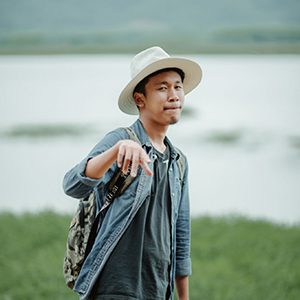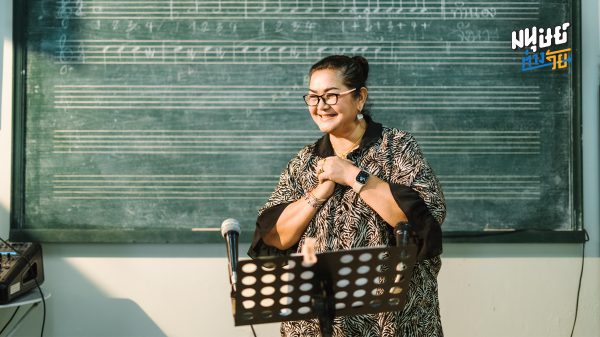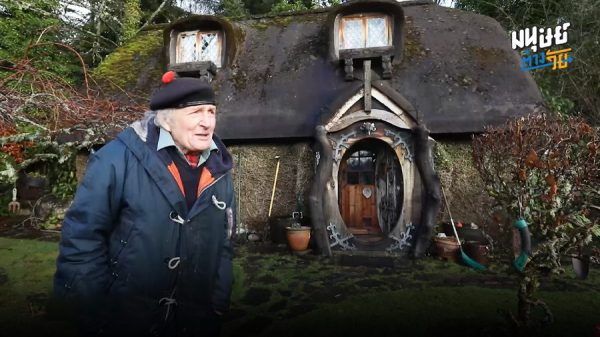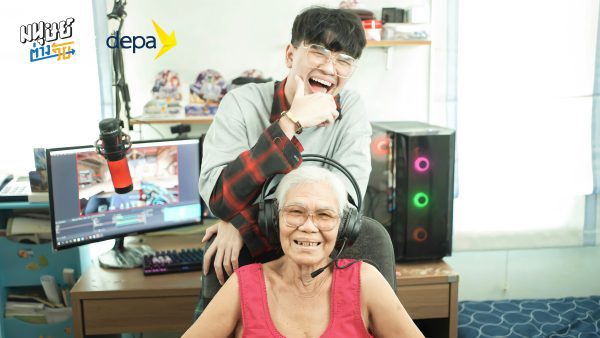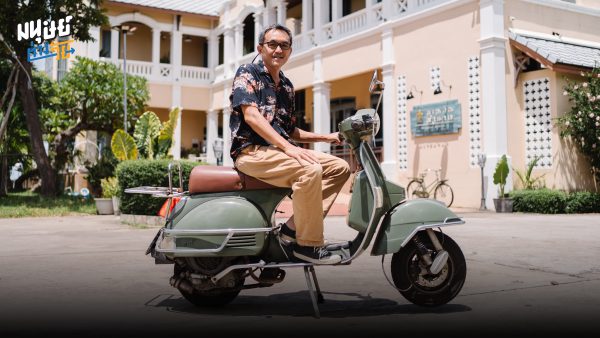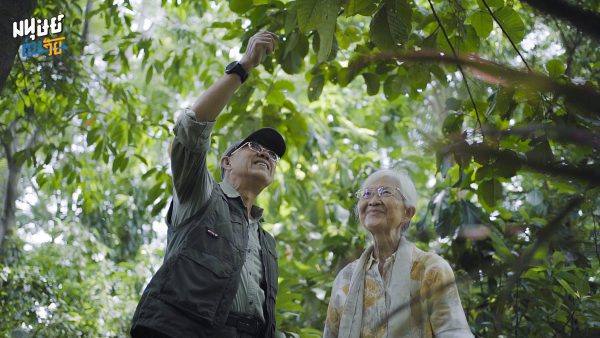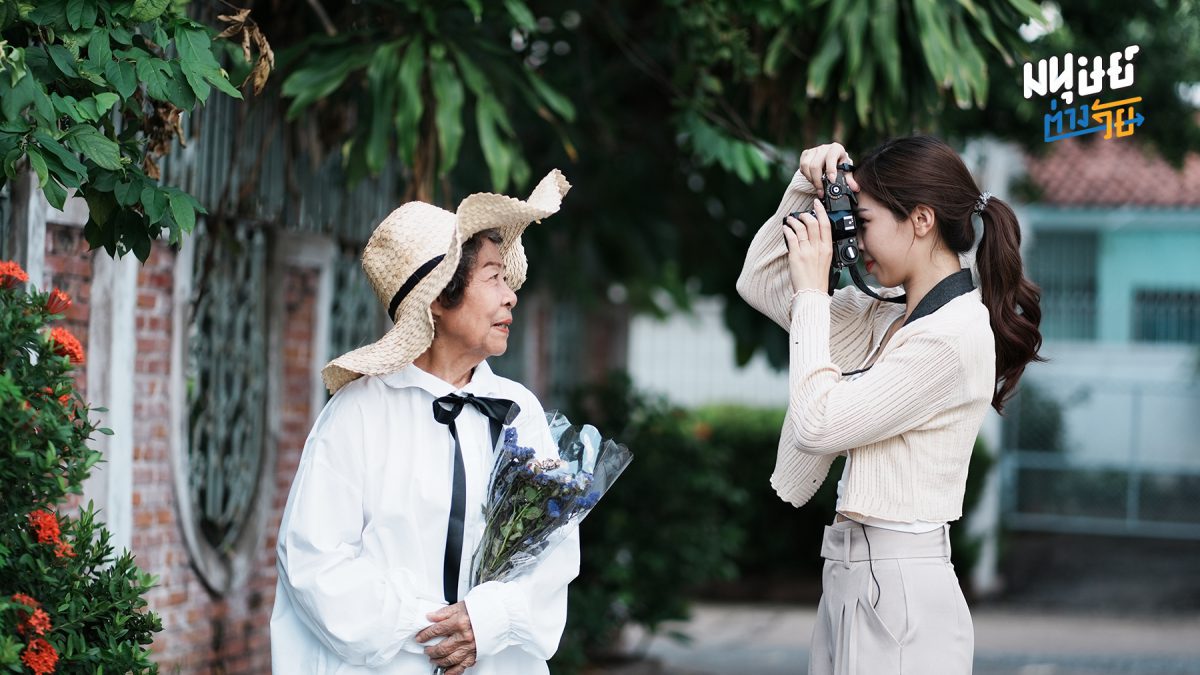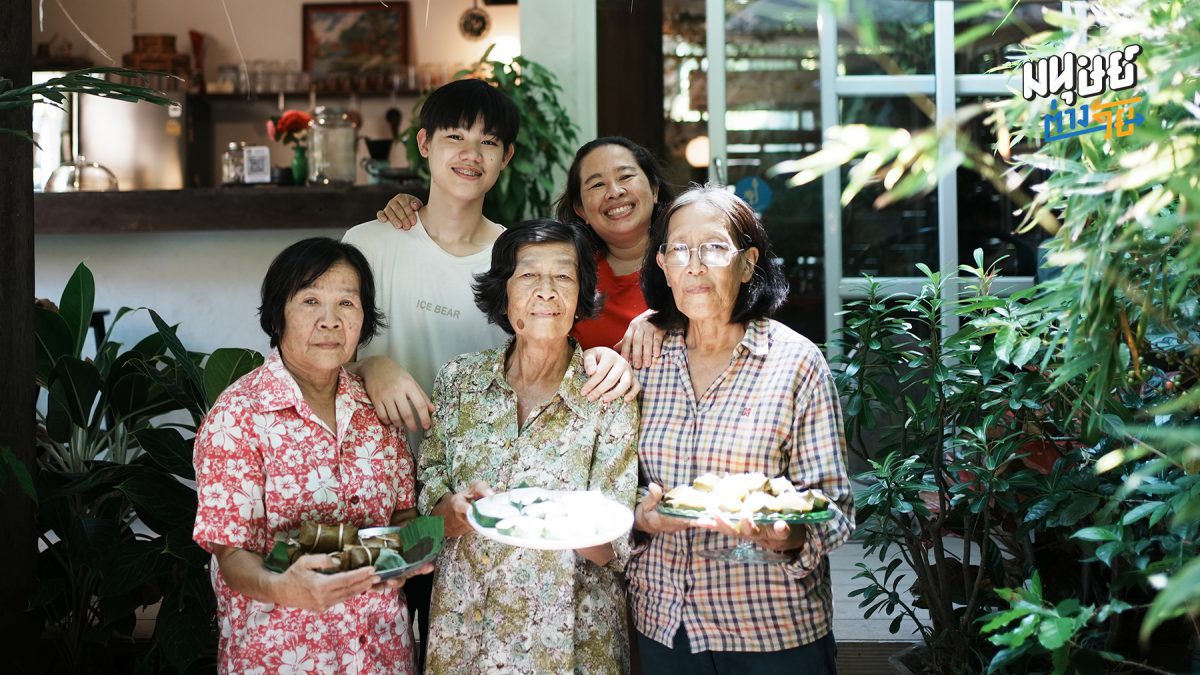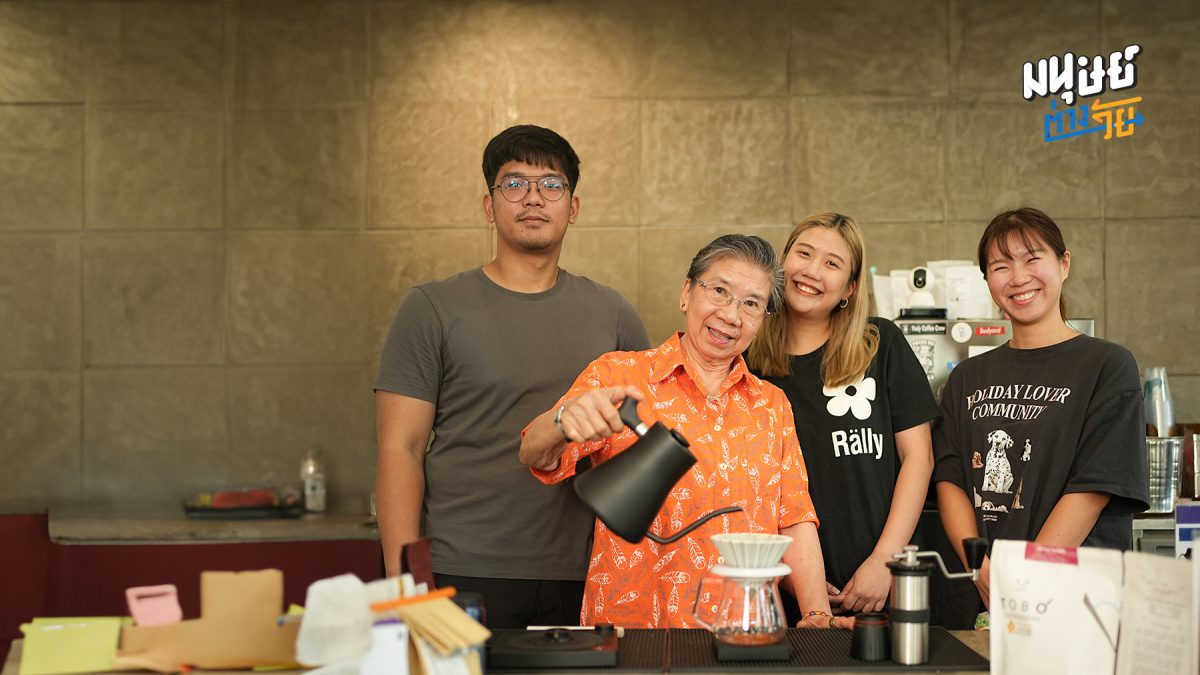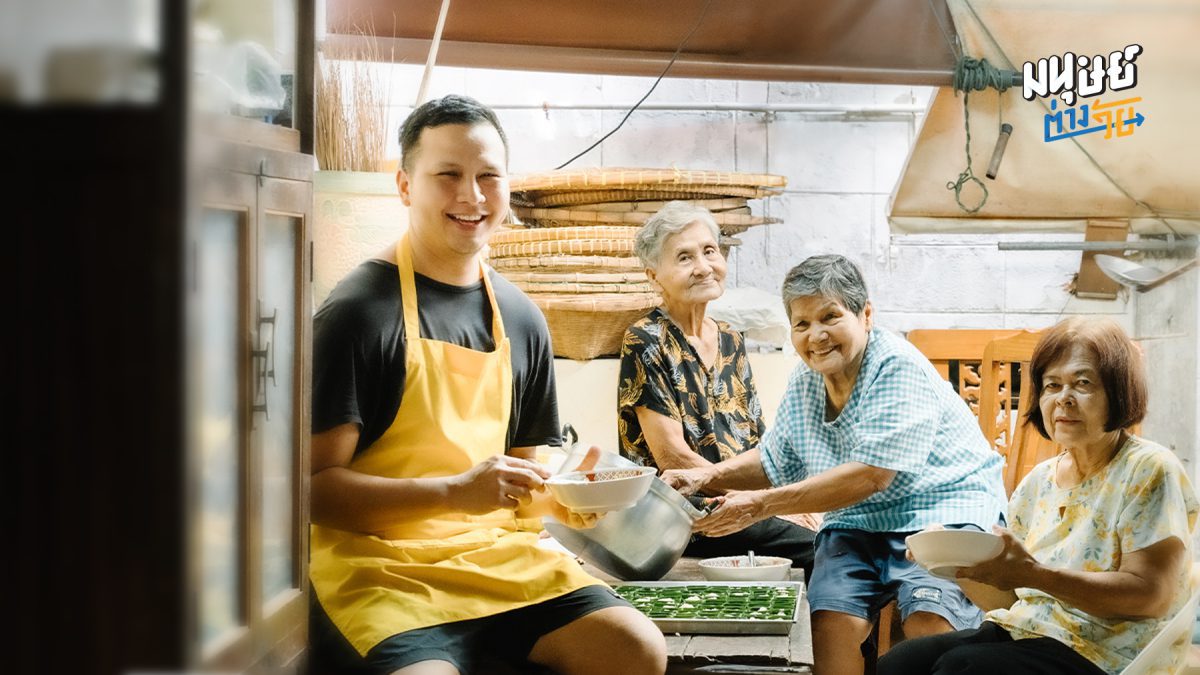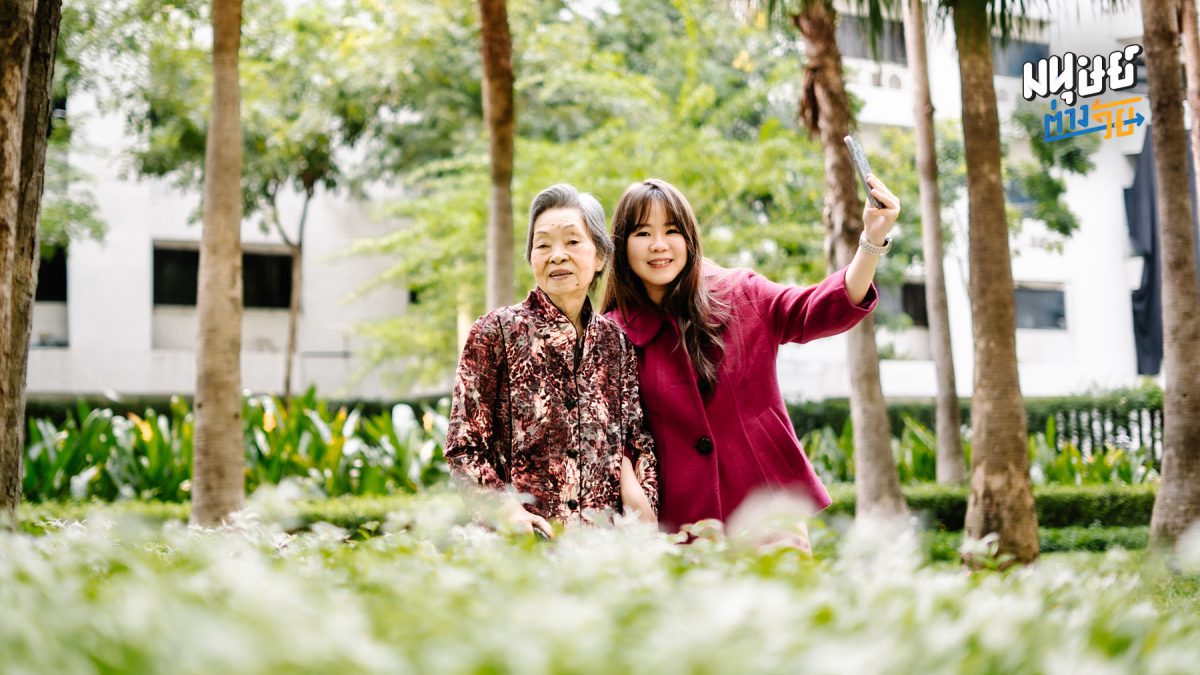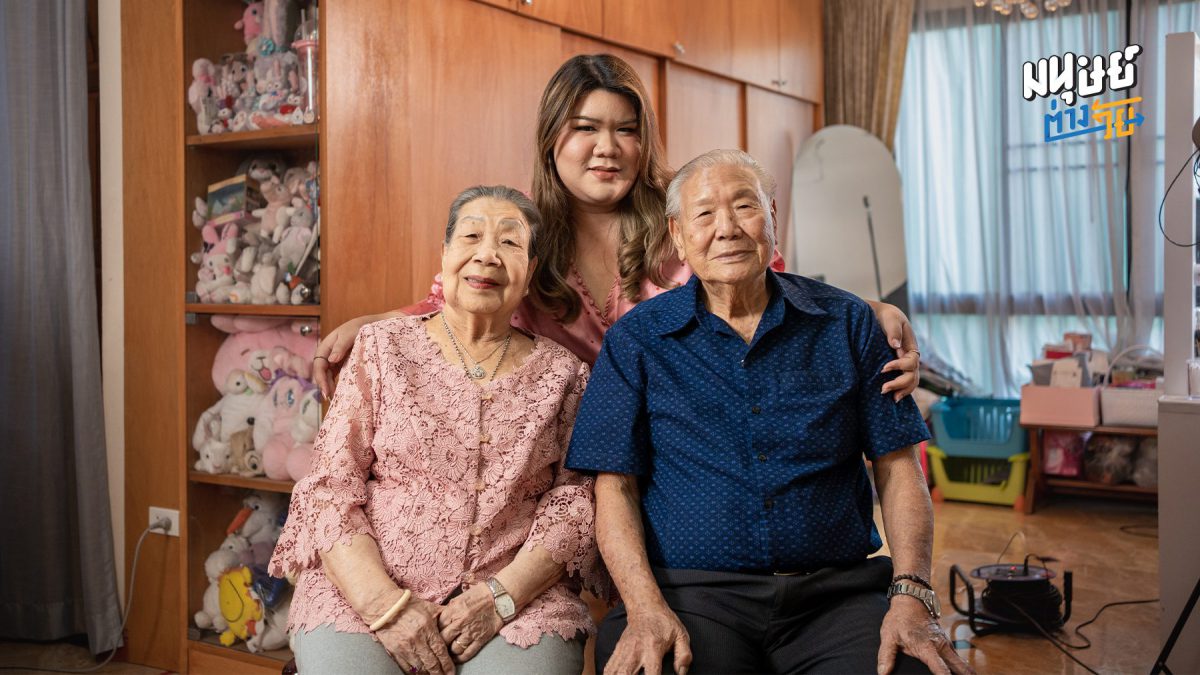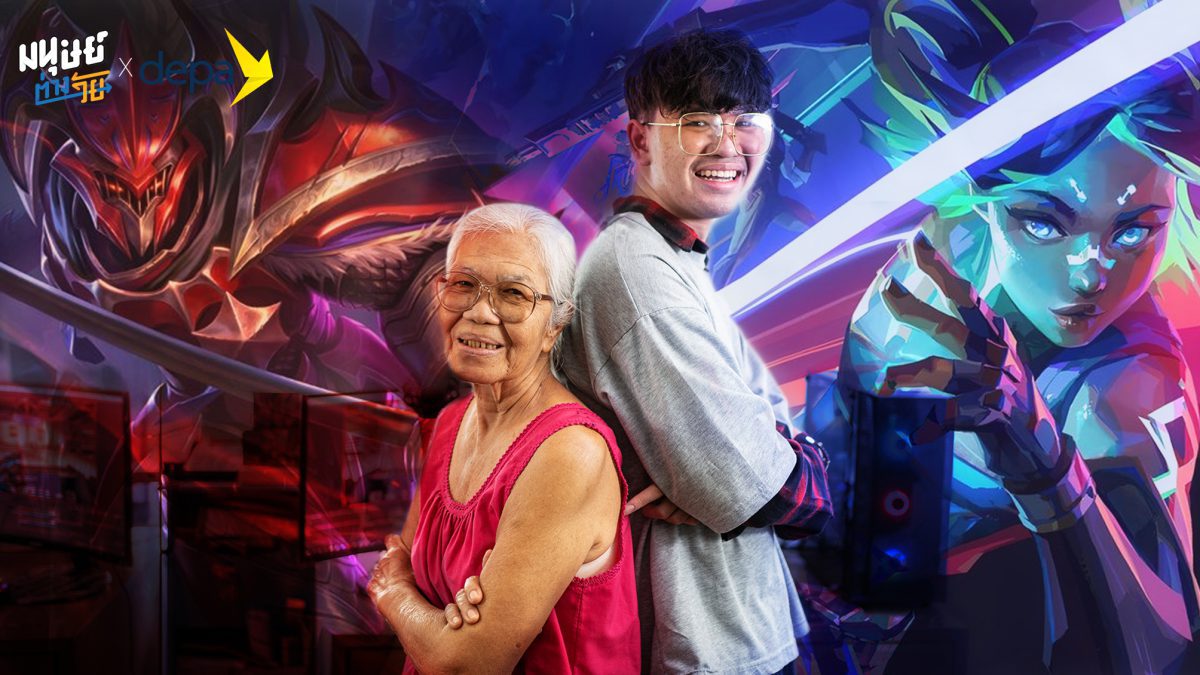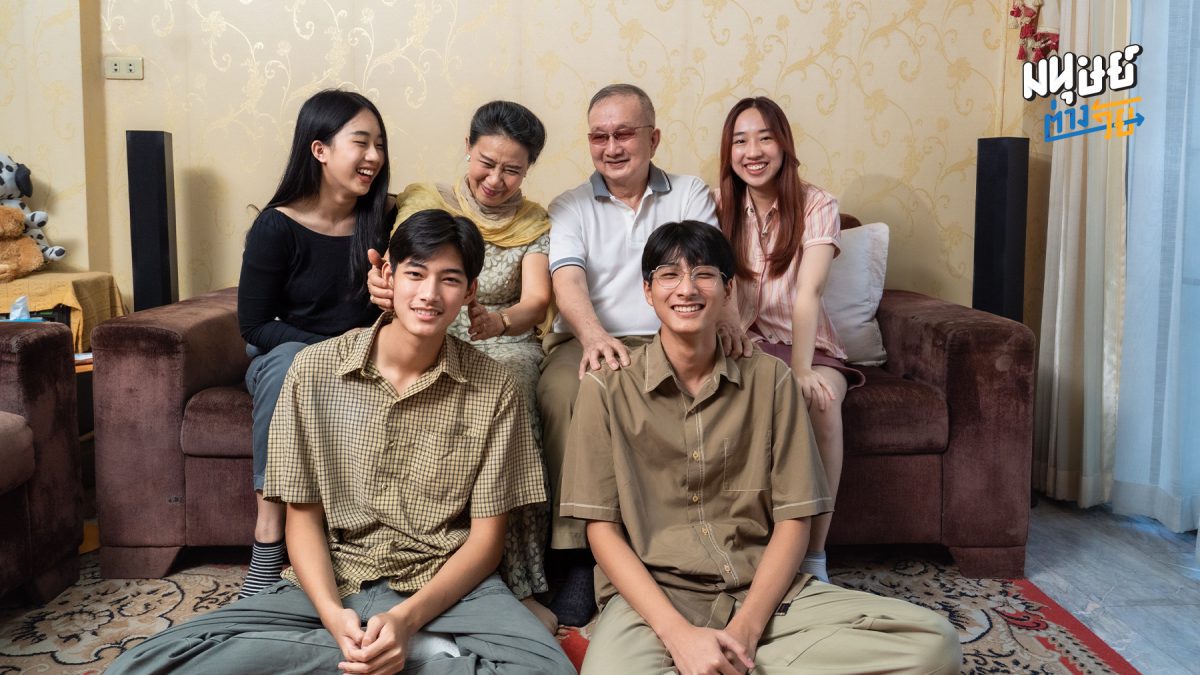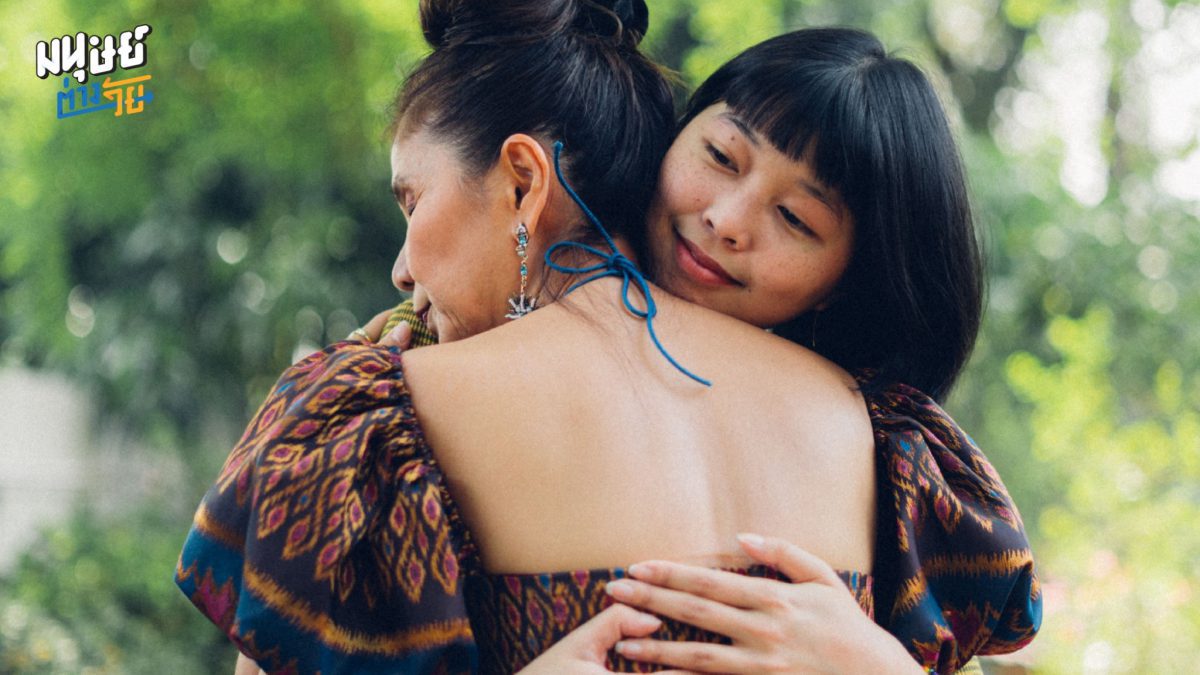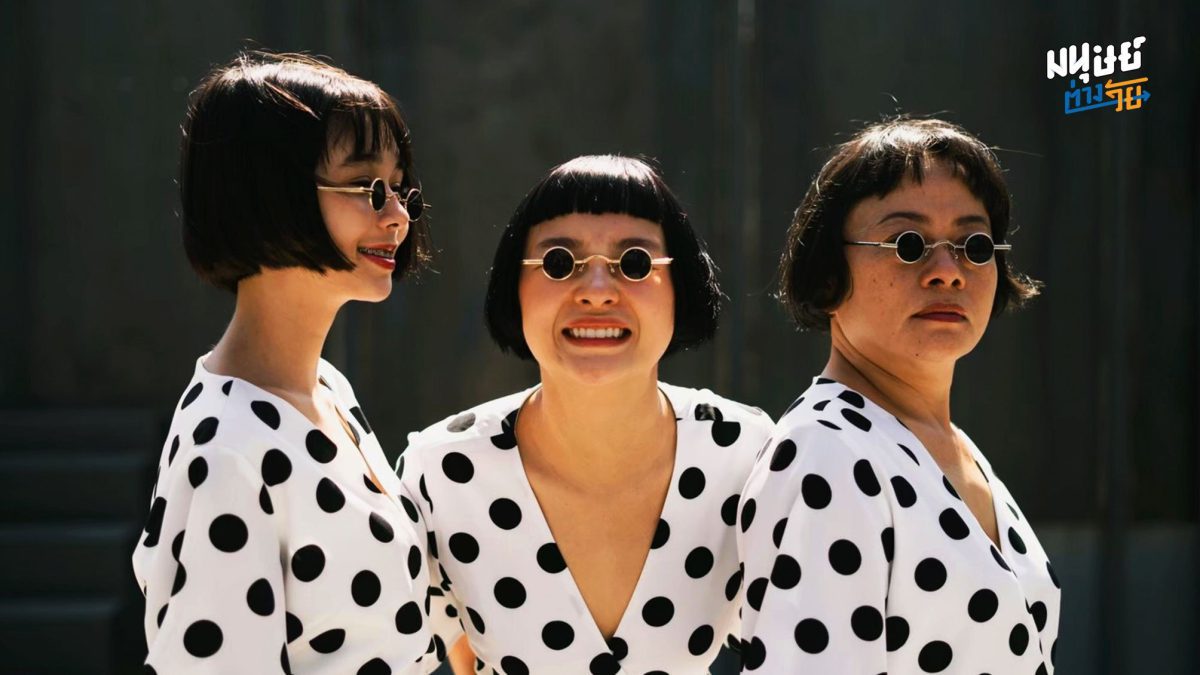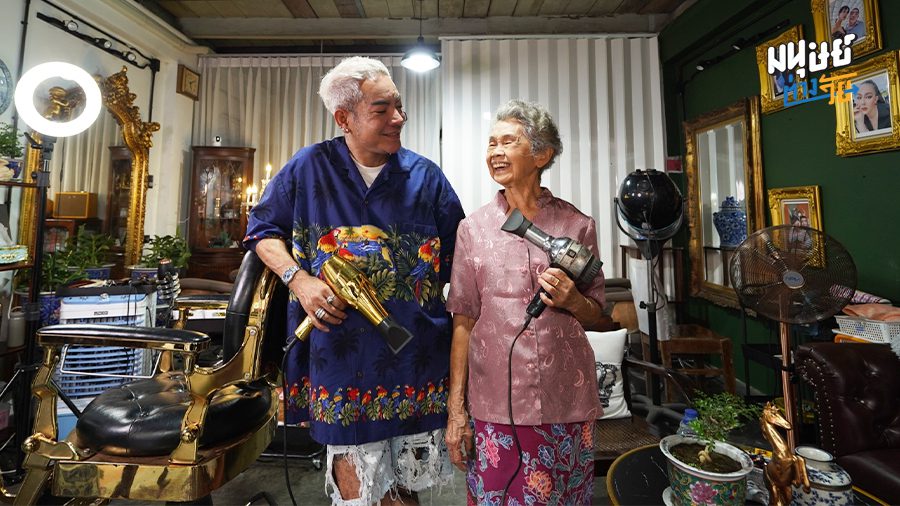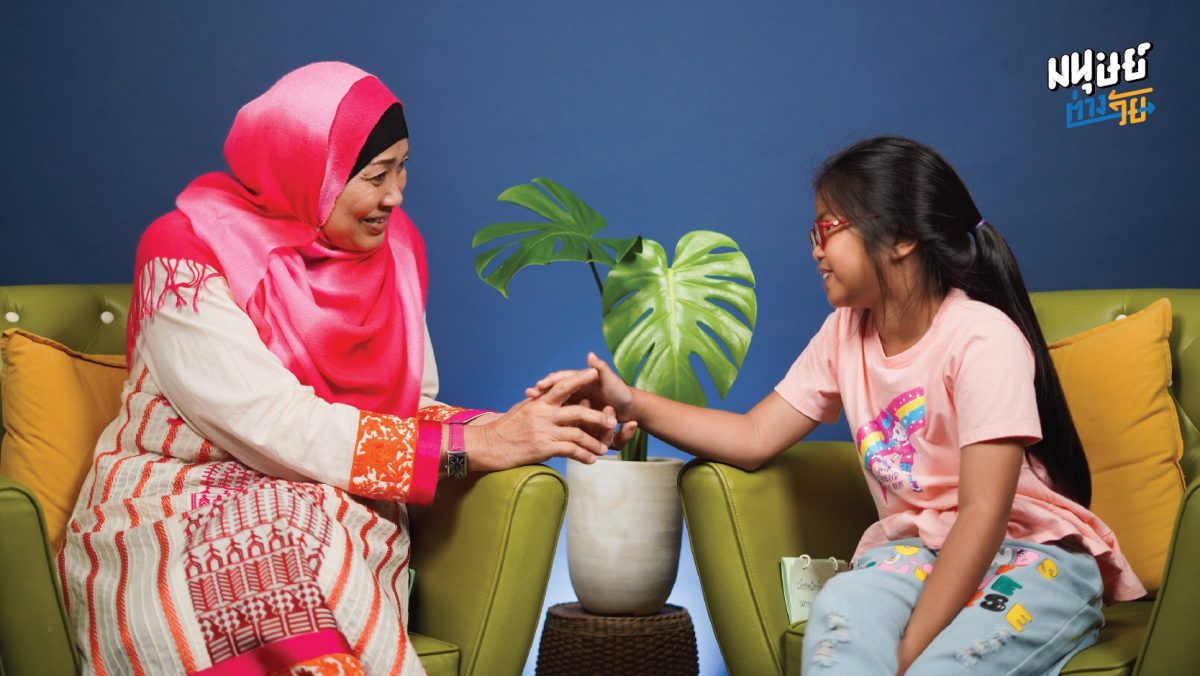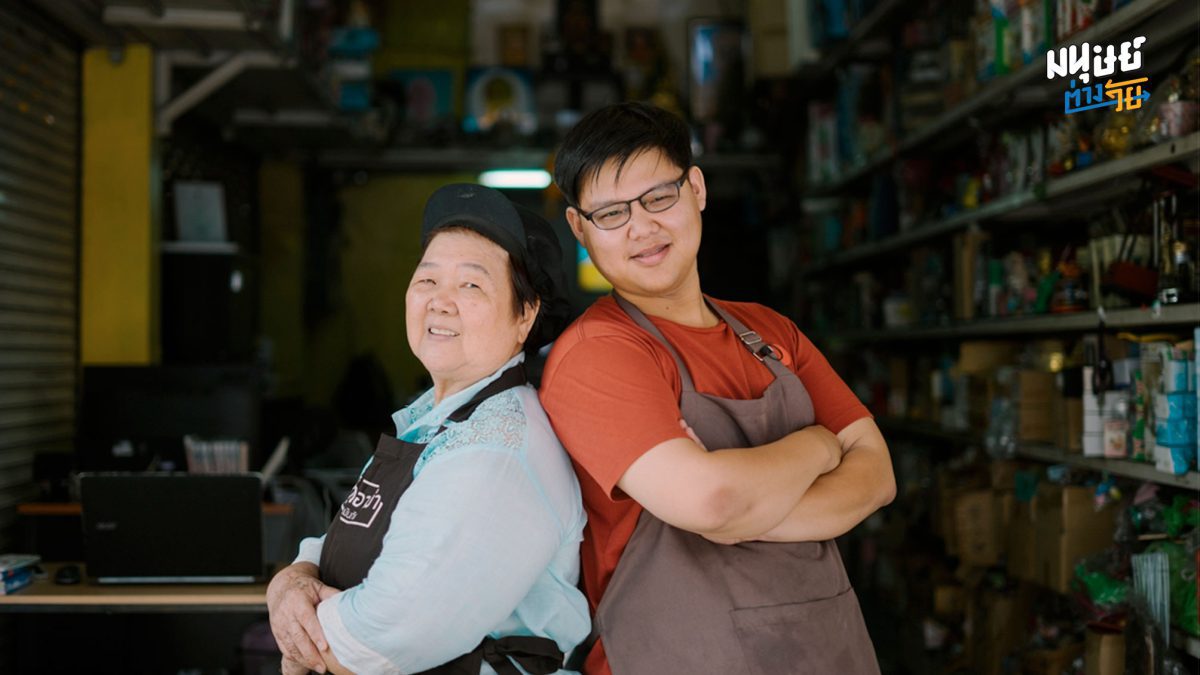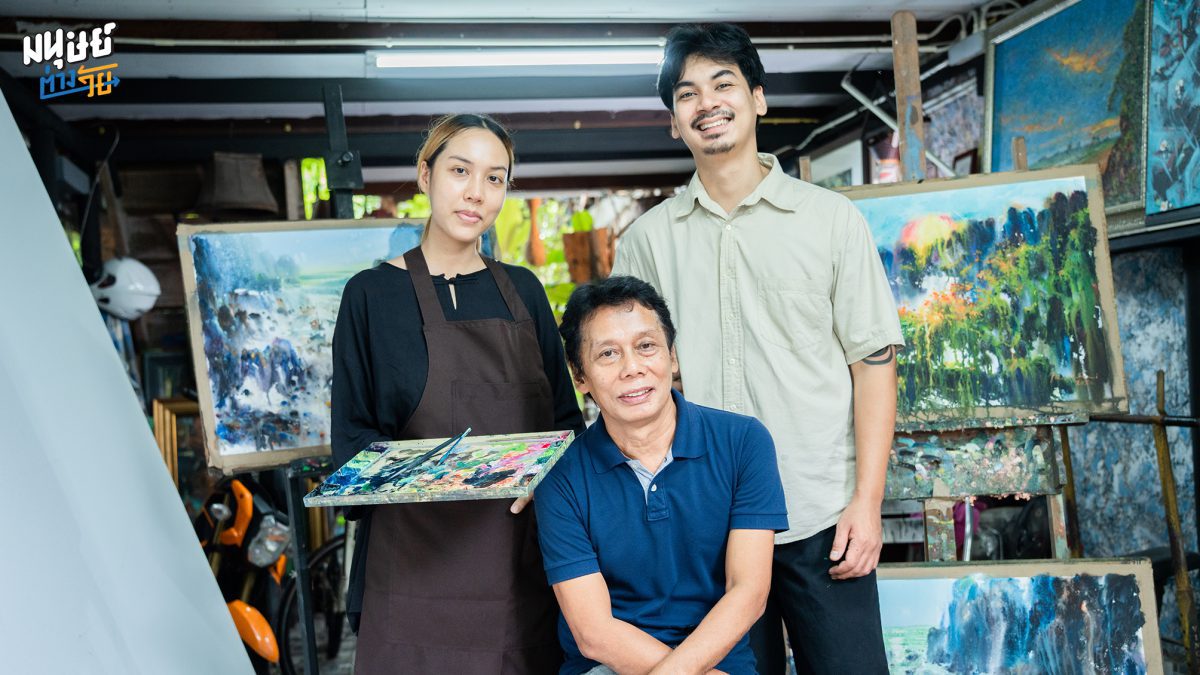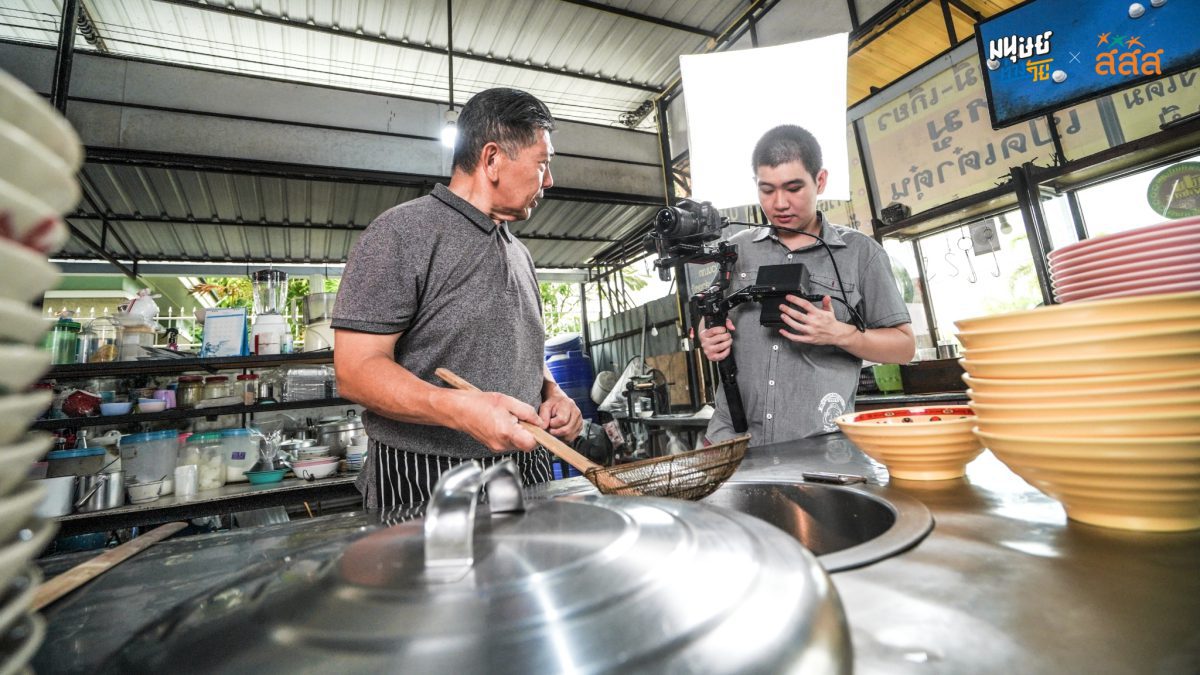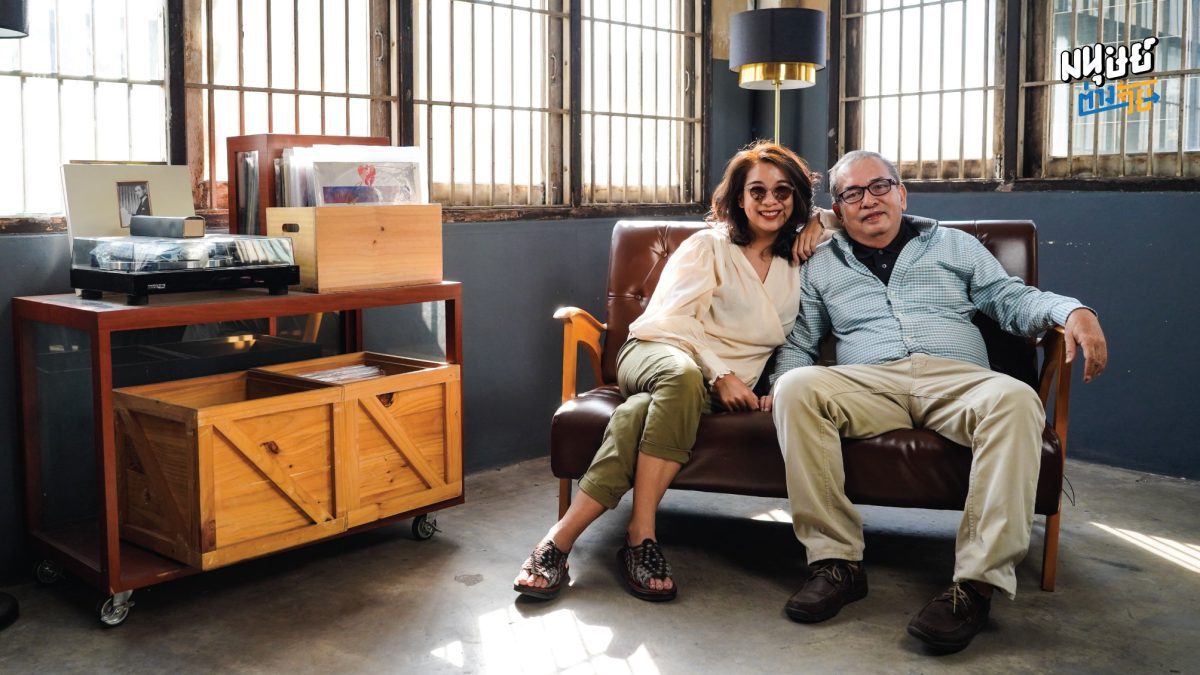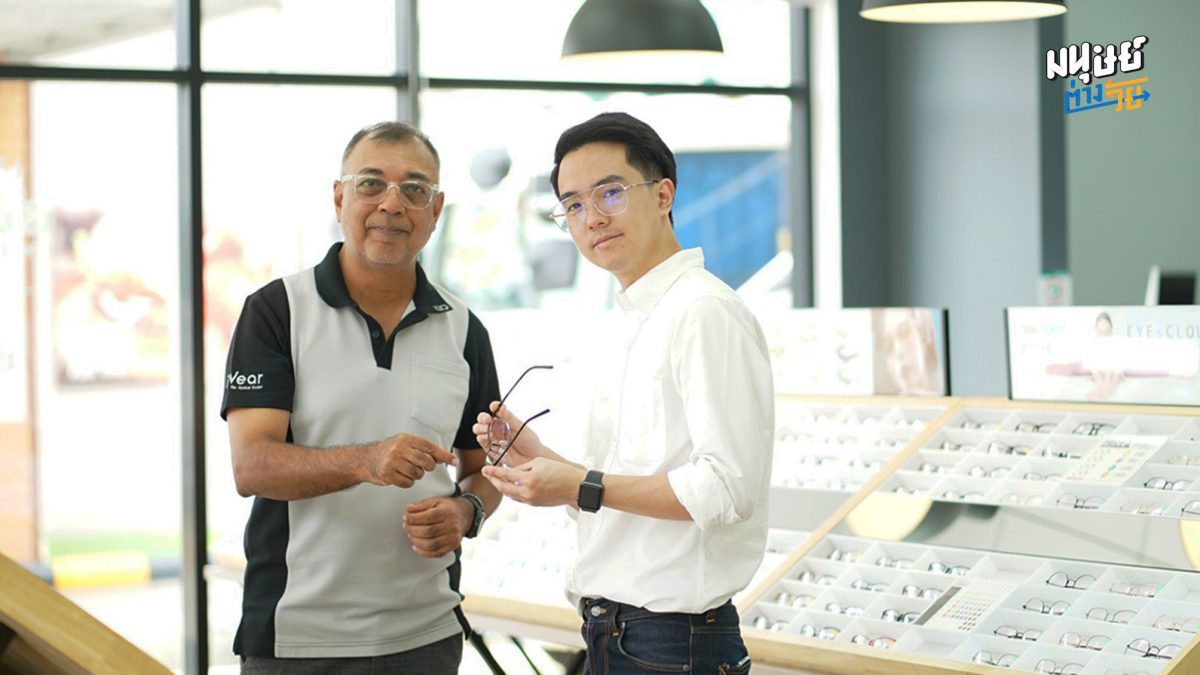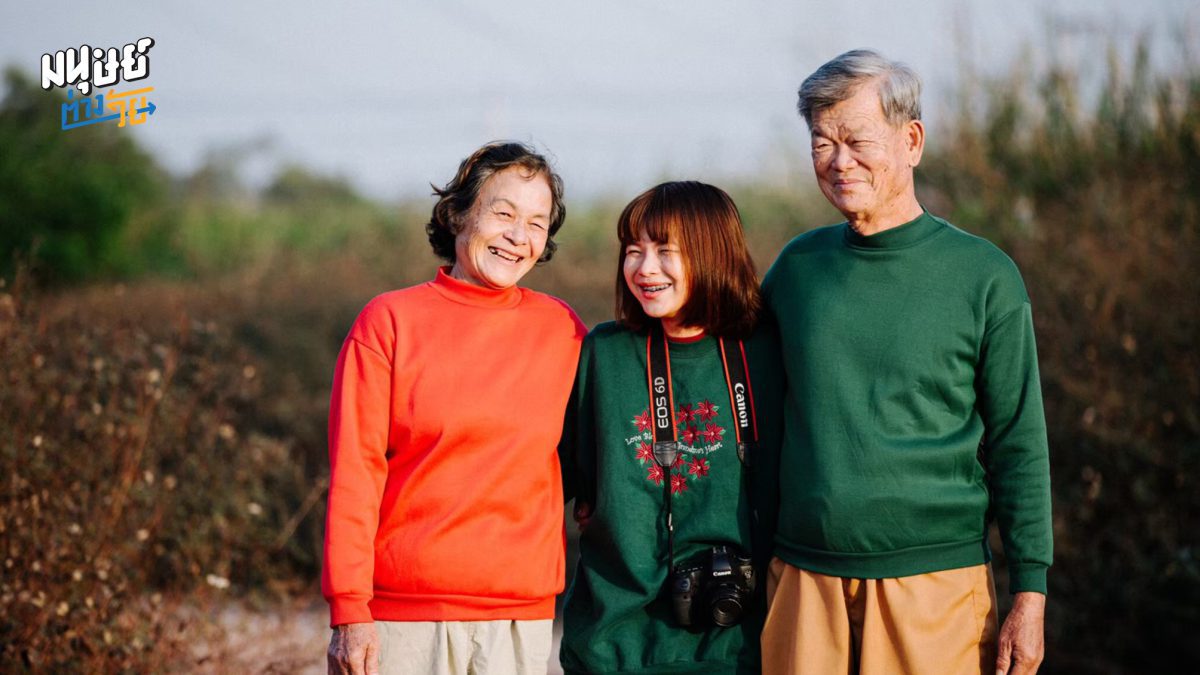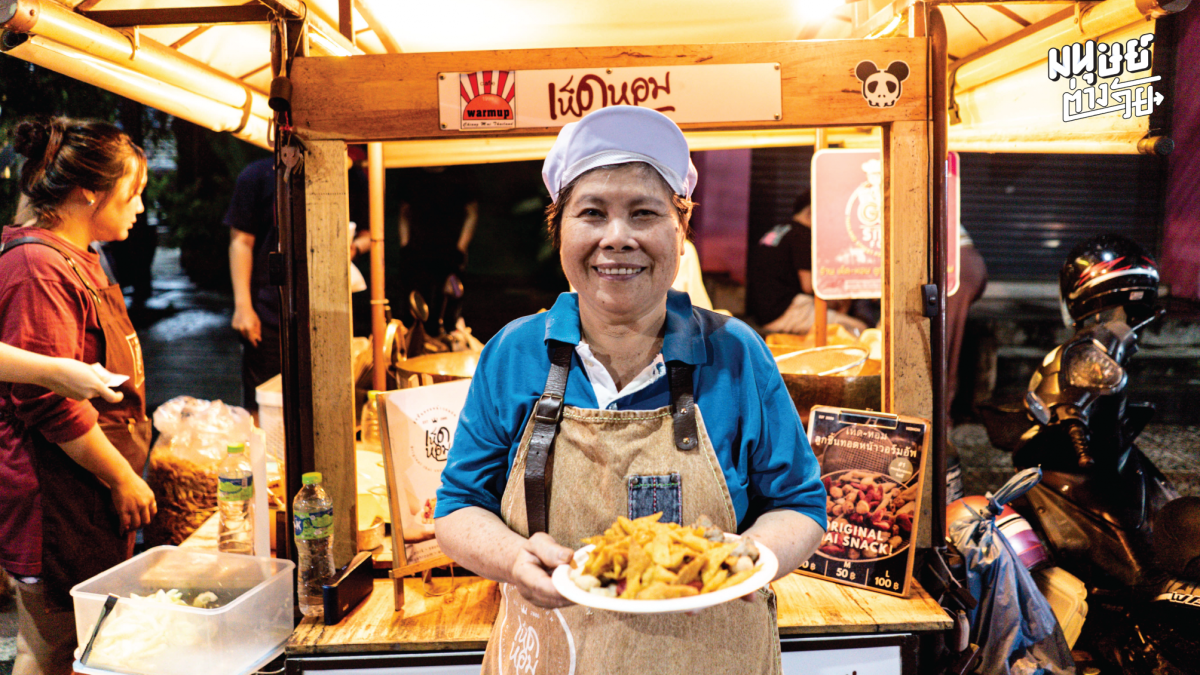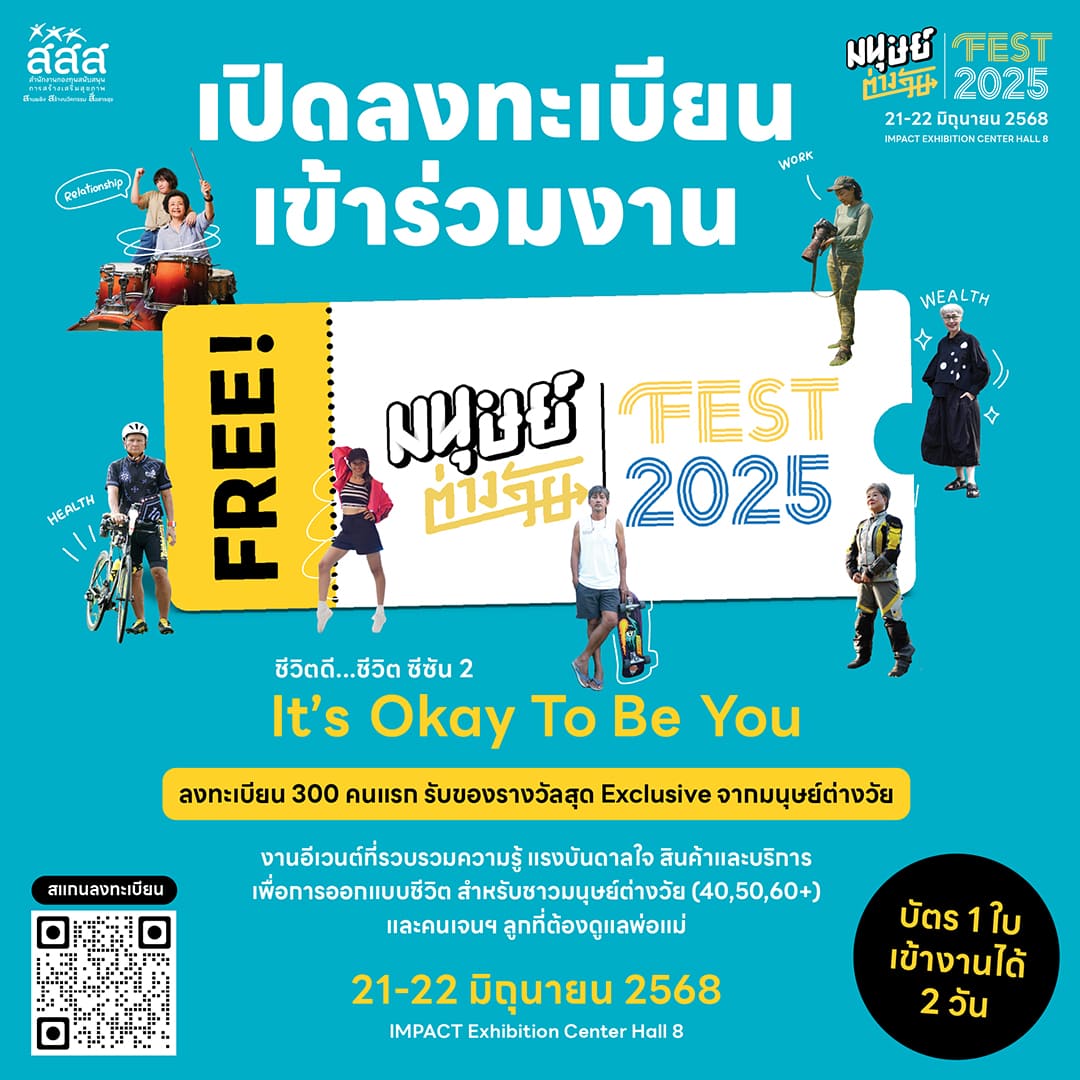เราจินตนาการถึงสังคมแบบไหนกันบ้าง เมื่ออีก 6 ปีข้างหน้า ไทยกำลังเข้าสู่สังคมสูงวัยระดับสุดยอด หรือ Super Aged Society ซึ่งหมายความว่าประชากรกว่า 1 ใน 4 จะเป็นผู้สูงวัย
“ ‘สังคมสูงวัยที่มีความสุข’ เป็นความสนใจร่วมกันของมนุษย์” อิซาโอะ คาโนะ ประธานศูนย์แลกเปลี่ยนระหว่างประเทศแห่งญี่ปุ่น (Japan Center for International Exchange—JCIE) เอ่ยในงานมอบรางวัล “นวัตกรรมแห่งเอเชียเพื่อผู้สูงวัยสุขภาพดี” หรือ Healthy Aging Prize for Asian Innovation (HAPI) ครั้งที่ 4 จัดที่กรุงเทพมหานคร เมื่อปลายเดือนมกราคมที่ผ่านมา
เมื่ออยู่ในงานดังกล่าว ภาพของสังคมสูงวัยที่แข็งแรงและมีความสุขดูจะจับต้องได้ ความที่เราได้เห็นผู้คนและองค์กรที่ทำงานขับเคลื่อนให้เกิดสังคมที่มีภาพในใจร่วมกันกว่าร้อยคนจากกว่า 10 ประเทศในภูมิภาคอาเซียนและเอเชียตะวันออกมาอยู่ด้วยกันในพื้นที่เดียว เป็นโอกาสดีที่มนุษย์ต่างวัยได้เข้าร่วมสังเกตการณ์งานมอบรางวัลครั้งนี้ด้วย
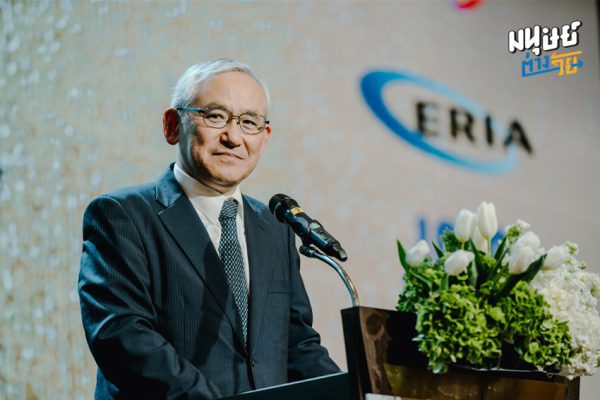


อิซาโอะ คาโนะ ประธานกรรมการและประธานเจ้าหน้าที่บริหารศูนย์แลกเปลี่ยนระหว่างประเทศแห่งญี่ปุ่น (Japan Center for International Exchange–JCIE) กล่าวว่าการบ่มเพาะสังคมสูงวัยที่มีความสุขเป็นสิ่งที่เราควรตั้งเป็นเป้าหมายและเป็นความสนใจร่วมกันของมนุษย์”
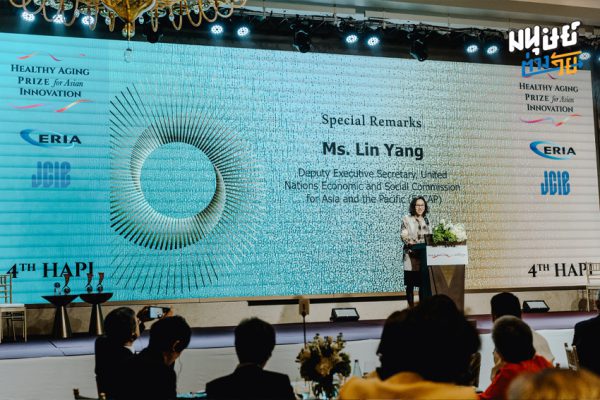


ลิน หยาง รองเลขาธิการบริหาร คณะกรรมการเศรษฐกิจและสังคมแห่งเอเชียและแปซิฟิก (เอสแคป) กล่าวว่าภูมิภาคเอเชียแปซิฟิกมีความเหลื่อมล้ำการเข้าถึงความรู้ด้านดิจิทัลสูงมาก โดยเฉพาะในหมู่ผู้สูงวัย ทำให้เป็นอุปสรรคต่อการจ้างงานและพบปะติดต่อกับผู้อื่น
กำลังใจของคนทำงานสร้างสรรค์สังคมผู้สูงวัย
รางวัล HAPI เป็นรางวัลที่มอบแก่องค์กรซึ่งทำงานเผยแพร่นวัตกรรมนโยบาย โครงการ บริการ และผลิตภัณฑ์ที่ตอบโจทย์ความท้าทายของสังคมสูงวัย โดยแบ่งรางวัลเป็น 3 สาขา ได้แก่ เทคโนโลยีและนวัตกรรม โครงการเพื่อชุมชน และการส่งเสริมการพึ่งพาตนเอง
โครงการจำนวนมากจาก 12 ประเทศที่สมัครเข้ามา ทำให้เห็นแนวโน้มการทำงานสร้างสรรค์สังคมผู้สูงวัยในปัจจุบัน นั่นคือ การใช้นวัตกรรมบริการสุขภาพในพื้นที่ที่ประชากรลดลง การช่วยให้ผู้สูงวัยมีอาชีพและทำงานต่อได้ การส่งเสริมการเรียนรู้ตลอดชีวิต และการทำให้ผู้สูงวัยเข้าร่วมกิจกรรมทางสังคมเพื่อลดความโดดเดี่ยว
ปีนี้ ไทยได้รับรางวัล 3 รางวัล หนี่งในนั้นเป็นรางวัลชนะเลิศ หรือ Grand Prize สาขาการส่งเสริมการพึ่งพาตนเอง ซึ่งผู้ได้รับรางวัลคือ มีดี (MEDEE) โครงการของวิทยาลัยการศึกษาตลอดชีวิต มหาวิทยาลัยเชียงใหม่
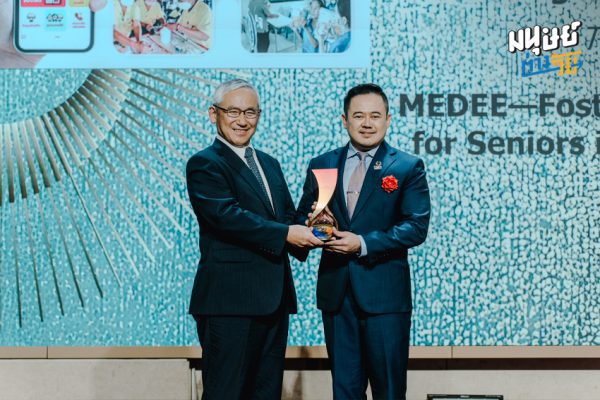


อิซาโอะ คาโนะ มอบโล่รางวัลชนะเลิศสาขาการส่งเสริมการพึ่งพาตนเองแก่ รศ.ดร. นัทธี สุรีย์ จาก “มีดี” โครงการเสริมสร้างทักษะการทำงานสำหรับผู้สูงวัยในยุคดิจิทัล วิทยาลัยการศึกษาตลอดชีวิต มหาวิทยาลัยเชียงใหม่
เชื่อมั่นในพลังการเปลี่ยนแปลงของผู้สูงวัย
ที่หน้าแรกของเว็บไซต์ www.lifelong.cmu.ac.th/medee เราจะเห็นถ้อยความ “พลังเกษียณสร้างชาติ” และ “เกษียณมีดี” ย้ำถึงความเชื่อมั่นที่ผู้ขับเคลื่อนโครงการมีต่อผู้สูงวัย โดยเฉพาะเมื่อเปิดโลกการเรียนรู้ให้กับผู้สูงอายุและคนทั่วไปทางแพลตฟอร์มออนไลน์ยอดนิยมอย่าง LINE ผนวกกับความช่วยเหลือจากชุมชนและเครือข่าย เช่นโรงเรียนผู้สูงอายุ ทำให้ผู้เรียนเพิ่มพูนทักษะในการใช้เทคโนโลยี รู้จักป้องกันตัวจากมิจฉาชีพออนไลน์ สร้างธุรกิจออนไลน์และอาชีพได้เอง ดูแลสุขภาพกายใจ กระทั่งก้าวออกจากความโดดเดี่ยวสิ้นหวังสู่การแบ่งปันสู่ชุมชน
Prof. Dato’ Dr. Tengku Aizan Hamid หนึ่งในกรรมการคัดเลือกผลงานจากประเทศมาเลเซีย พูดไว้ในงานว่า “มีดี” โดดเด่นตรงที่ไม่ใช่เพียงเสนอการเรียนรู้ทางแพลตฟอร์มออนไลน์ แต่ยังสร้างสรรค์ระบบแบบองค์รวมเพื่อทำให้ผู้สูงวัยเข้มแข็ง โดยไม่ได้มุ่งเฉพาะการศึกษาเพียงอย่างเดียว หากยังทำให้ผู้สูงวัยใช้ชีวิตได้อย่างเป็นอิสระ ลดภาระในครอบครัว และมีความยั่งยืน รวมทั้งสร้างเครือข่ายในชุมชนด้วย นับเป็นความสำเร็จที่จับต้องได้
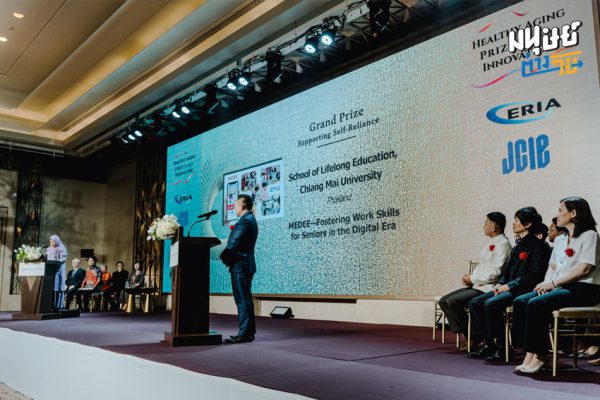


Prof. Dato’ Dr. Tengku Aizan Hamid หนึ่งในกรรมการคัดเลือกผลงาน กล่าวถึง “มีดี” ว่ามีความโดดเด่นตรงที่ไม่ใช่เพียงเสนอการเรียนรู้ทางแพลตฟอร์มออนไลน์ แต่ยังสร้างสรรค์ระบบแบบองค์รวมเพื่อทำให้ผู้สูงวัยเข้มแข็งด้วย
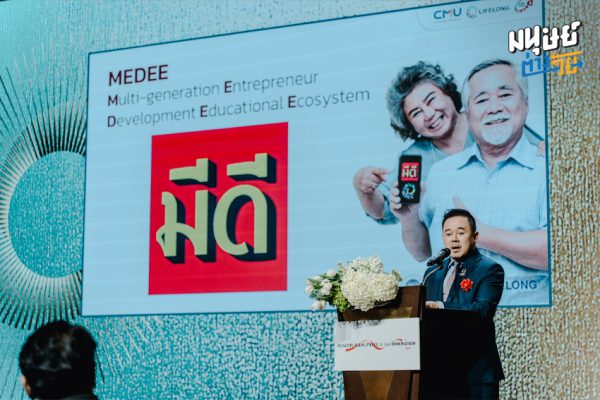


รศ.ดร. นัทธี สุรีย์ กล่าวว่า ก้าวแรกที่มีดีทำได้คือช่วยสร้างทักษะที่จำเป็น โดยเฉพาะความรู้ด้านดิจิทัลให้แก่ผู้สูงวัยผ่านทางแอปพลิเคชันที่คุ้นเคยเช่นไลน์ ช่วยสร้างอาชีพและรายได้ในตลาดออนไลน์ ด้วยคอร์สการเรียนรู้กว่า 30 คอร์ส
ในช่วงแรกมีดีมุ่งทำงานด้านการเรียนรู้ทางออนไลน์ผสมผสานกับการสนับสนุนของเครือข่ายในชุมชน เน้นคอร์สด้านทักษะอาชีพ การมีรายได้ และลดภาระพึ่งพิง แต่เมื่อผ่านไป 2 ปี ก็พบว่า “คนที่มาเรียนเป็นคนแข็งแรง ส่วนคนไม่แข็งแรงหรือติดเตียงอยู่บ้านก็มาไม่ได้ สิ่งสำคัญจึงเป็นเรื่องสุขภาพด้วย จะโฟกัสเรื่องเศรษฐกิจอย่างเดียวไม่ได้” รศ. ดร. นัทธี สุรีย์ รองผู้อำนวยการฝ่ายนวัตกรรมการศึกษา วิทยาลัยการศึกษาตลอดชีวิต มหาวิทยาลัยเชียงใหม่ เล่าถึงช่วงต้นของการดำเนินโครงการ
“เราได้เจอหลายกรณีที่ประสบความสำเร็จ เป็นหลักฐานชัดเจนเลยว่า ผู้สูงวัยมีดีเยอะมาก แค่เปลี่ยนทัศนคติและปรับการคิดเท่านั้น” อาจารย์นัทธีบอก และเล่าถึงตัวอย่างกรณีผู้สูงอายุที่ถูกมิจฉาชีพออนไลน์หลอกจนสูญเสียเงินไปมากมายและรู้สึกวาตนเองไร้ค่า เกิดภาวะซึมเศร้า จนกระทั่งได้เรียนรู้ว่าตนเองสามารถสร้างสรรค์ผลิตภัณฑ์อย่างน้ำพริกตาแดงขายได้ “เราสอนเขาไลฟ์สดขาย พอมีไทยพีบีเอสมาถ่ายเรื่องเขาไป เขาก็เริ่มเป็นที่รู้จัก และขายน้ำพริกจนปลดหนี้ได้ เขาประทับใจมากขนาดปวารณาตัวเป็นวิทยากรให้ชุมชนของเขาด้วย”
มีดียังทำงานร่วมกับชมรมผู้สูงอายุและโรงเรียนผู้สูงอายุ 4 พันแห่งทั่วประเทศ และยังได้เดินทางไปรู้จักหน่วยงานที่ทำงานกับผู้สูงอายุทั่วประเทศ จนได้พบว่าเครือข่ายมีความสำคัญอย่างมาก “เราจะสร้างให้ชุมชนสานต่อการเรียนรู้ด้วยต้วเองได้และมีความยั่งยืนมากขึ้น” อาจารย์นัทธีบอกถึงทิศทางในอนาคต
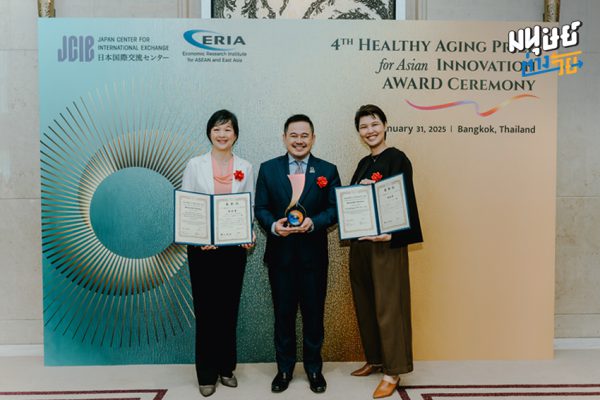

สามผู้ได้รับรางวัล HAPI จากประเทศไทย จากซ้ายไปขวา: ผศ. ดร. ดวงใจ หล่อธนวณิชย์ จาก “เรดี้ ซีเนียร์”, รศ.ดร. นัทธี สุรีย์ จาก “มีดี” และวริศรา กลีบบัว จาก “YoungHappy Plus”
นอกจากมีดีแล้ว โครงการของไทยที่ได้รับรางวัลชมเชยของ HAPI ยังมี 2 โครงการ คือ YoungHappy Plus กับ Ready Senior โดย YoungHappy Plus ที่ดำเนินการโดย YoungHappy Plus Co., Ltd. ออกแบบแพลตฟอร์มออนไลน์ให้ผู้สูงวัยและคนทั่วไปได้สำรวจกิจกรรมและการเรียนรู้ ตั้งแต่ด้านเทคโนโลยี การออกกำลังกาย ภาษา และการดูแลจิตใจผ่านคลาสออนไลน์หลากหลาย จนสร้างความเปลี่ยนแปลงด้านบวกในหมู่ผู้เข้าร่วม ส่วน Ready Senior ศูนย์พัฒนาธุรกิจและการดูแลผู้สูงอายุ (ABCD) คณะพาณิชยศาสตร์และการบัญชี มหาวิทยาลัยธรรมศาสตร์ เปิดคอร์สออนไลน์เตรียมความพร้อมให้คนอายุ 50 ปีขึ้นไปด้วยการเพิ่มทักษะด้านดิจิทัลและการดูแลสุขภาพ การเปิดตลาดขายของออนไลน์ และการจับคู่การจ้างงาน โดยมีผู้เรียนผ่านทางแอปพลิเคชันซูมแล้วกว่า 4 พันคน
เมื่อรางวัลหมายถึงชุมชนและเครือข่าย
อันที่จริงก่อนหน้านี้ องค์กรของไทยเคยได้รับรางวัล HAPI มาแล้วหลายองค์กร เช่น โครงการ STRONG Program ที่เทศบาลเมืองบึงยี่โถ เทศบาลทับมา ทำงานร่วมกับเทศบาลเมืองยูกาวาระและองค์กร Nogezaka-Glocal ประเทศญี่ปุ่น, Buddy HomeCare ของมูลนิธิพัฒนางานผู้สูงอายุที่ออกแบบแอปพลิเคชันติดตามดูแลผู้สูงอายุและจัดอบรมนักเรียนจิตอาสาเยี่ยมบ้านผู้สูงอายุ, และ forOldy ร้านคุณตาคุณยายที่จำหน่ายและให้เช้าอุปกรณ์และของใช้สำหรับผู้สูงอายุ, โครงการดูแลผู้สูงอายุระยะยาวเชิงป้องกันของกรุงเทพมหานคร ตลอดจนมนุษย์ต่างวัยเองที่เคยได้รับรางวัลพิเศษสำหรับการต่อต้านการเหยียดอายุเมื่อปี 2565 และได้มาร่วมในพิธีมอบรางวัลครั้งนี้ด้วย
นอกเหนือจากกลุ่มคนทำงานเพื่อผู้สูงวัยในบ้านเรา ปีนี้ รางวัลต่างๆ HAPI ยังเป็นของประเทศญี่ปุ่น ฟิลิปปินส์ เกาหลีใต้ สิงคโปร์ และมาเลเซีย ที่ล้วนแต่ทำโครงการสร้างสรรค์และน่ามหัศจรรย์ โดยเฉพาะการริเริ่มโดยคนรุ่นใหม่ ทั้งยังเป็นการทำงานร่วมกันของหลากหลายวัยอย่าง Nurse & Craft ของญี่ปุ่นที่รวมเอาการดูแลผู้สูงอายุที่บ้านกับการฟื้นฟูชุมชนมาผสานกัน เช่นการเชื้อเชิญคนภายนอกมาเยี่ยมเยือนชุมชนและรับประทานอาหารฝีมือผู้สูงวัยในขุมชน, Go Bike Project ของฟิลิปปินส์ที่ช่วยให้คุณตาคุณยายอุ่นใจเมื่อเผชิญกับภัยพิบัติด้วยเหล่าจิตอาสาวัยรุ่นนักปั่นจักรยาน ซึ่งผ่านการอบรมด้านการดูแลสุขภาพเบื้องตน หรือการพัฒนาแอปพลิเคชัน IM-OK ของสิงคโปร์ที่ออกแบบให้ผู้สูงอายุใช้แทบเล็ตเช็คอินเพื่อบอกว่า “I’m OK” ในแต่ละวันด้วย
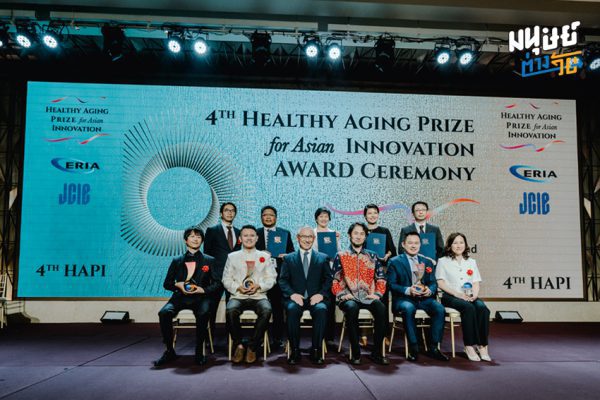


อาจารย์นัทธีแห่ง MEDEE บอกว่า แม้ก่อนหน้านี้จะทำงานร่วมกับองค์กรต่างๆ ในประเทศอยู่แล้ว แต่รางวัล HAPI ทำให้เริ่มได้รับความสนใจจากองค์กรต่างประเทศในอาเซียนในการทำงานร่วมกัน “เป็นหลักฐานสำคัญว่าการได้รับรางวัลนี้เปิดโอกาสมาก ทำให้เราสร้างสะพานความร่วมมือกับหลายประเทศ ได้เรียนรู้ซึ่งกันและกัน ได้ดูว่าบริบทที่แตกต่างกัน เขาแก้ปัญหาอย่างไร อาจได้ไอเดียใหม่ๆ จากงานที่แบ่งปันทรัพยากรด้วยกัน และจะทำให้เราเก่งขึ้นด้วย”
ไม่ใช่เท่านี้ ความเป็นเครือข่ายของ HAPIยังอยู่ในเว็บไซต์ ahwin.org ที่ออกแบบให้เป็นฐานข้อมูลสำหรับสืบค้นโครงการต่างๆ จากหลากหลายประเทศที่ได้รับรางวัลตั้งแต่ปี 2563 ทั้งจากหมวดหมู่เทคโนโลยีและนวัตกรรม โครงการเพื่อชุมชน และการส่งเสริมการพึ่งพาตนเอง หรือจากประเทศต่างๆ ในภูมิภาค รวมถึงคำค้นและประเภทขององค์กรด้วย
จากเว็บไซต์นี้ มนุษย์ต่างวัยจึงได้ตื่นตากับนวัตกรรมมากมายจากประเทศต่างๆ ในภูมิภาค เช่น การทำคิวอาร์โค้ดขนาดจิ๋วสำหรับติดเล็บผู้มีภาวะสมองเสื่อมในญี่ปุ่น วันสต็อปเซอร์วิสสำหรับผู้สูงวัยในชุมชนของจีน โมเดลการใช้การแพทย์ทางไกลในการดูแลสุขภาพผู้สูงวัยในชุมชนห่างไกลของไต้หวัน หรือโครงการเยือนบ้านผู้สูงวัยยามเผชิญกับโควิดในอินโดนีเซีย ตลอดจนโมเดลผู้สูงวัยในชุมชนเวียดนามดูแลตัวเองให้สุขภาพดีด้วยการผสานกิจกรรมหลากหลายเข้าด้วยกัน เป็นต้น
แลกเปลี่ยนเรียนรู้และสร้างเครือข่าย
ในปีนี้ รางวัล HAPI ที่เกิดจากความร่วมมือของสององค์กรของประเทศญี่ปุ่น นั่นคือ ศูนย์แลกเปลี่ยนระหว่างประเทศแห่งญี่ปุ่น (Japan Center for International Exchange–JCIE) กับสถาบันวิจัยเศรษฐกิจเพื่ออาเซียนและเอเชียตะวันออก (Economic Research Institute for ASEAN and East Asia—ERIA) ภายใต้การสนับสนุนจากโครงการเพื่อสุขภาพและความเป็นอยู่ที่ดีแห่งเอเชีย (Asia Health and Wellbeing Initiative—AHWIN) โดยรัฐบาลญี่ปุ่น เปิดกว้างให้ผู้สนใจส่งใบสมัครได้ถึง 10 ภาษา รวมทั้งภาษาไทยด้วย เป็นครั้งแรก เพื่ออำนวยความสะดวกแก่ผู้สมัคร
ผู้ได้รับรางวัลชนะเลิศเช่นอาจารย์นัทธีพูดถึงการสมัครรางวัล HAPI “อย่างน้อยเราจะได้รู้ว่าคนอื่นๆ ที่เป็นผู้สมัครด้วยกัน เขาทำอะไรบ้าง อาจเกิดไอเดียดีๆ ที่ทำให้งานของเราดีมากขึ้น จากที่ต่างคนต่างทำ พอเป็นเครือข่ายแล้ว กลายมาเป็นร่วมมือกันทำ เสริมพลังกัน ทำให้งานของเราเกิดผลกว้างไกลมากขึ้น วันนี้ก็ได้เห็นแล้วว่าเราจะร่วมมือกันอย่างไร”
องค์กรที่สนใจสามารถติดตามข่าวสารการเปิดรับสมัครครั้งต่อไป รวมทั้งเยี่ยมชมเครือข่าย HAPI ได้ที่เว็บไซต์ AHWIN
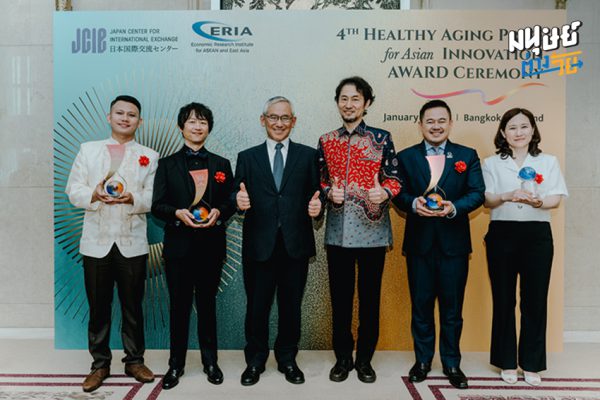

The Far-reaching Meaning of “HAPI”
Awards for Innovators in Aging Society Development
What kind of society do we envision in the next 6 years when Thailand enters a Super Aged Society, where more than 1 in 4 of the population will be elderly?
“An aging happy society is humanity’s shared interest,” said Isao Kano, President and CEO of the Japan Center for International Exchange (JCIE), at the 4th Healthy Aging Prize for Asian Innovation (HAPI) award ceremony, held on January 31 in Bangkok.
At the event, the vision of a healthy and happy aging society seemed tangible. When one saw over a hundred people and organizations from more than 10 ASEAN and East Asian countries working together to drive society toward this shared vision.



Isao Kano, President and CEO of the Japan Center for International Exchange (JCIE) noted that cultivating an aging happy society is what we should aim for. And it is the common interest of human beings.



Ms. Lin Yang, Deputy Executive Secretary, United Nations Economic and Social Commission for Asia and the Pacific (UNESCAP) addressed that The Asia-Pacific region has disparities in access to digital literacy, known as the great digital divide, especially among the elderly, which prevents them from employment and staying connected.
Support for Creative Workers in Elderly Care
The HAPI award recognizes organizations that promote innovative policies, programs, services, and products addressing aging society challenges. The awards are divided into three categories: Technology & Innovation, Community-Based Programs, and Self-Reliance Support.
Numerous projects from 12 countries revealed current trends in creative elderly care work, including: providing healthcare services in depopulated areas, helping seniors work longer, promoting lifelong learning and addressing social isolation.
This year, Thailand received three awards, including the Grand Prize in the Self-Reliance Support category, awarded to the MEDEE project by Chiang Mai University’s School of Lifelong Education.



Isao Kano presents the Grand Prize award trophy for supporting Self-Reliance to Assoc. Prof. Dr. Nuttee Suree, MEDEE, an initiative program fostering work skills for seniors in the digital era, School of Lifelong Education, Chiang Mai University
Believing in the Transformative Power of the Elderly
On the homepage www.lifelong.cmu.ac.th/medee, we see the phrases “Retirement Power Builds the Nation” and “Retirement with Value,” emphasizing the project leaders’ confidence in the elderly. By opening up learning opportunities through popular online platforms like LINE, combined with community and network support such as elderly schools, seniors can enhance their digital skills, protect themselves from online scams, create online businesses and careers, maintain physical and mental health, and move from isolation and hopelessness to community sharing and contributing.
Prof. Dato’ Dr. Tengku Aizan Hamid, one of the selection committee members from Malaysia, noted that MEDEE stands out for not just offering online platform learning but creating a holistic system to empower the elderly. It goes beyond education to help seniors live independently, reduce family burdens, and achieve sustainability while building community networks.


Prof. Dato’ Dr. Tengku Aizan Hamid, one of the selection committee members, noted that MEDEE stands out for not just offering an online learning platform but also creating a holistic system to empower the elderly.



Assoc. Prof. Dr. Nuttee Suree, said that MEDEE’s first step helped build essential skills, such as digital knowledge, for the elderly through their familiar application like LINE. This helps create careers and generate income in the online market with over 30 learning courses.
Initially, MEDEE focused on online learning combined with community network support, emphasizing career skills, income generation, and reducing dependency. “After two years, we found that healthy people came to learn, while those who were unwell or bedridden couldn’t attend. Health became crucial – we couldn’t focus solely on economics,” explained Assoc. Prof. Dr. Nuttee Suree, Deputy Director of Educational Innovations at Chiang Mai University’s School of Lifelong Education.
“We’ve encountered many success cases, clear evidence that elderly people have great potential. It just takes a change in attitude and mindset,” says Dr. Nuttee. He shared an example of an elderly person who lost significant money to online scams, felt worthless, and became depressed, until learning they could create and sell products like chili paste. “We taught them to sell through live streaming. After Thai PBS featured her story, she became well-known and sold enough chili paste to clear their debts. She was so impressed and volunteered to become a community’s mentor.”
MEDEE works with elderly clubs and schools across 4,000 locations nationwide and has connected with elderly care organizations throughout the country, discovering the crucial importance of networks. “We aim to help communities sustain self-directed learning,” Dr. Nuttee adds.



Three HAPI award recipients from Thailand, from left to right: Assist. Prof. Dr. Duangjai Lorthanavanich of Ready Senior, Assoc. Prof. Dr. Nuttee Suree of MEDEE and Varisra Kleebbua of YoungHappy Plus
Besides MEDEE, two other Thai projects received HAPI honorable mentions: YoungHappy Plus and Ready Senior. YoungHappy Plus, operated by YoungHappy Plus Co., Ltd., designs online platforms for seniors and others to explore activities and learning, from technology to exercise, language, and mental health care, through various online classes. Ready Senior, by Thammasat University’s ABCD Center, offers online courses preparing people aged 50+ with digital skills, health care, online marketplace, and job matching, having served over 4,000 learners via Zoom.
When Awards Mean Community and Networks
Previously, several Thai organizations have received HAPI awards, including the STRONG Program by Bueng Yitho and Thap Ma municipalities working with Yugawara City and Nogezaka-Glocal of Japan, Buddy HomeCare by the Foundation for Older Persons’ Development, forOldy’s equipment store for seniors, Bangkok’s preventive long-term elderly care program and ‘Manoottangwai’, which received a special award for combatting ageism in 2022 and participated in this year’s award ceremony.
This year’s HAPI awards also went to projects from Japan, the Philippines, South Korea, Singapore, and Malaysia, featuring creative and amazing initiatives, especially those started by young people and involving intergenerational collaboration. Examples include Japan’s Nurse & Craft combining home care with community revival, the Philippines’ Go Bike Project helping seniors feel secure during disasters through young cycling volunteers, and Singapore’s IM-OK app designed for daily check-ins by the elderly.



Dr. Nuttee from MEDEE notes that the HAPI award has attracted interest from ASEAN organizations for collaboration. “This award opens many opportunities, helping us build cooperation bridges with multiple countries, learn from each other, see how different contexts solve problems, and potentially share resources and new ideas to improve our work.”
The HAPI network extends to ahwin.org, designed as a database for searching various award-winning projects since 2020 across technology and innovation, community programs, and self-reliance support categories from different regional countries.
Exchange, Learning, and Network Building
This year, HAPI, a collaboration between Japan Center for International Exchange (JCIE) and Economic Research Institute for ASEAN and East Asia (ERIA) supported by Japan’s Asia Health and Wellbeing Initiative (AHWIN), accepted applications in 10 languages, including Thai, for the first time.
Grand Prize winner Dr. Nuttee spoke about applying for HAPI: “At minimum, we learn what other applicants are doing, potentially getting ideas to improve our work. From working individually, we become a network of collaborators, reinforcing each other and expanding our impact. Today we’ve seen how we can work together.”
Those who are interested may stay informed about the upcoming application opening by following the news on AHWIN

